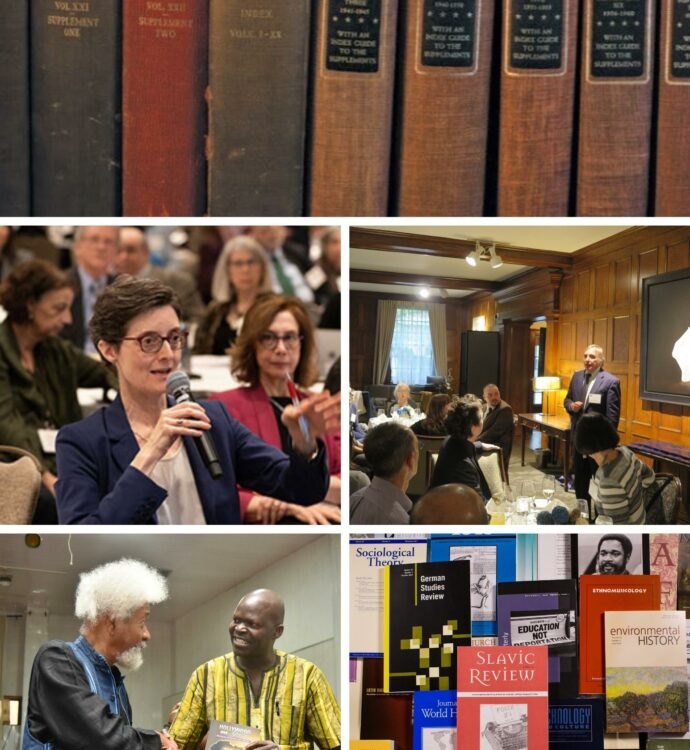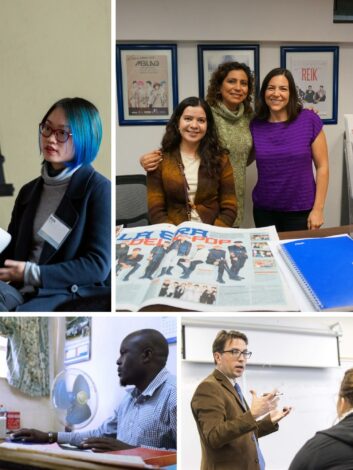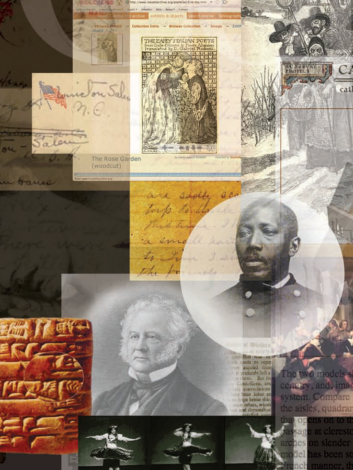
Our Impact

ACLS has played essential roles in establishing pivotal committees, convenings, and learned societies that have influenced the shape of American and international higher education over the past century. Learn more about our history.
Learned Societies: The Foundation of ACLS
The original American Council of Learned Societies first convened in September 1919 and was comprised of delegates from ten scholarly societies. The group stated its mission as “the advancement of humanistic studies in all fields of the humanities and social sciences and the maintenance and strengthening of national societies dedicated to those studies.”
Over the next century, ACLS member societies not only expanded in number to the current 81 scholarly organizations, but continued to play a critical role in advancing humanistic research, setting national standards for emerging disciplines of study, improving teaching practices and policies, and sharing the results of scholarship with the public.
Starting in the 1920s, our federation of scholarly organizations played key roles in ACLS-convened research planning committees that help strengthen long-established areas of study and establish and develop fields such as African American studies, China studies, Latin American studies, musicology, the histories of religions, the study of Native American languages, and more.
Today, ACLS member societies actively participate in regular convenings designed to explore ways to strengthen the promotion of research, education in their fields of study, and enhance engagement with scholars at all career levels and increase diversity within their ranks.
Former ACLS Vice President Steve Wheatley wrote extensively about the critical role of scholarly associations, how they operate and interact, and current challenges as they pursue their mission to advance scholarship in the ACLS Centennial Volume.
Supporting Humanistic Scholars At Every Stage, In a Variety of Fields
ACLS began awarding fellowships and grants to individual scholars in 1926. That year, drawing on funds from one of the Rockefeller philanthropies, the ACLS Committee on Aid to Research distributed grants of up to $300 each to 21 applicants “engaged in constructive projects of research and who are in actual need of such aid and unable to obtain it from other sources.”
Since then, ACLS has sought to meet the needs of an ever-changing academy and meet new challenges faced by scholars, whether early-career, independent, established educators, those working within the administrative ranks, and those forging paths in public-facing research.
These include such groundbreaking programs as:
- ACLS Study Fellowships (1962-1983), which focused on support for professional development to give scholars accomplished in one specialization the opportunity to gain competence in another field relevant to their research.
- ACLS American Studies Program (1962-1997), made possible with support from the Ford Foundation, offered fellowships to faculty from East Asia and Europe teaching American history, literature, law, economy, or government oversees which enabled them to conduct research at US colleges and universities. The program awarded 1,389 fellowships and many awardees went on to become leaders of American studies associations in their home countries.
- ACLS Humanities Program in Belarus, Russia, and Ukraine (1999-2010), made possible with support from the Carnegie Corporation of New York, offered grants to humanities scholars doing exemplary work in the former Soviet Union during a time of crisis. Over 12 years, 743 awards were made for project grants and publication in humanities fields. ACLS also organized a dozen annual meetings in the region, modeled on the annual meetings of ACLS member societies.
- ACLS Digital Innovation Fellowships (2006-2015), made possible with support from the Mellon Foundation, awarded 60 fellowships to a diverse group of scholars whose projects contributed to the advancement of digital scholarship by broadening understanding of its nature and exemplifying the robust infrastructure necessary for creating further such works.
- African Humanities Program (2008-2021), made possible with support from the Carnegie Corporation of New York, has worked to reinvigorate the humanities on the continent through fellowship competitions, regional convenings, production and distribution of publications, and more in Ghana, Nigeria, South Africa, Tanzania, and Uganda.
- Mellon/ACLS Public Fellows Program (2011-2020), made possible with support from the Mellon Foundation, placed recent PhDs from the humanities and humanistic social sciences in two-year staff positions at partnering nonprofit and government organizations to demonstrate the effectiveness of analytical, expressive, and research capacities developed through education in the humanities.
- Leading Edge Fellowship Program (2020-Present) aims to demonstrate the potential of people with advanced degrees in the humanities and interpretive social sciences to solve problems outside the academy. Recent PhDs awarded as part of the first two cycles of the program, made possible with support from the Henry Luce Foundation, are working with communities in responding to the COVID-19 crisis and advancing public understanding of the pandemic. The third cycle, made possible with support from the Mellon Foundation, has placed recent PhDs with partnering organizations to advance social justice projects.
- Emerging Voices Fellowship Program (2020-Present) was created by ACLS in response to the severe economic downturn caused by the COVID-19 pandemic to support early career scholars whose voices, perspectives, and broad visions will strengthen institutions of higher education and humanistic disciplines in the years to come. Fellows take up year-long placements with members of ACLS’s Research University Consortium, where they can advance their research and professional development while contributing to the teaching, programming, and administrative work of their host university.
Accelerating Change and Pushing Boundaries
Over the past century, ACLS has played a vital role as an innovator and driver of positive change in higher education, and within and beyond the academy. In addition to convening groundbreaking committees to explore and promote emerging areas of study, ACLS has been a vocal advocate for the advancement and support of humanistic study, and developed and published seminal resources and volumes that have significantly influenced the world of humanistic research, the distribution of scholarship, and methods of teaching within academe.
- ACLS committees founded several influential journals including Speculum. A Journal of Medieval Studies, founded in 1926; Journal of the History of Ideas, launched in 1940; and East European Politics and Societies and Cultures, started in 1986.
- In 1959, ACLS form three pivotal joint committees – contemporary China, Near and Middle East studies, and African studies – with the Social Sciences Research Council with the aim of promoting and guiding the growth of these areas of study at American universities.
- In 1963, ACLS joined with the Council of Graduate Schools in the United States and the United Chapters of Phi Beta Kappa to establish the National Commission on the Humanities to conduct a study of the state of the humanities in America. The 1964 Report of the Commission on the Humanities recommended “the establishment by the President and the Congress of the United States of a National Humanities Foundation.” Following this recommendation, in 1965 President Lyndon B. Johnson signed legislation creating the National Endowment for the Humanities and the National Endowment for the Arts.
Inspired by a symposium on the future of humanistic studies at the 1938 annual meeting and written by a team of leading scholars, the book presented a forceful argument for the reimagining of higher education to meet the needs of a rapidly changing world.
The importance of liberal education can hardly be exaggerated…If democracy is to make headway against authoritarianism, it must rely on a form of education which is as effective for the promotion of democratic ideals and the liberal spirit as propaganda has been effective for the achievement of authoritarian ends.
- In 1973, then ACLS president Frederick H. Burkhardt joined a delegation of US academic leaders to China, the first such delegation to visit the nation in more than three decades.
- From 1987 to 1989, ACLS organized a project on comparative constitutionalism with support from the Ford Foundation, culminating in the book Constitutionalism and Democracy: Transitions in the Contemporary World and leading to the Eastern European Constitutionalism Teacher-Training Project.
- In spring 2007 the ACLS-Teagle Foundation Working Group on the Teacher-Scholar published Student Learning and Faculty Research: Connecting Teaching and Scholarship on how to promote effective undergraduate learning through the teacher-scholar model.
- In fall 2006 the ACLS Commission on Cyberinfrastructure in the Humanities and Social Sciences released a final report, Our Cultural Commonwealth, on its investigation into technology and humanistic research, with a call on the need to develop the cyberinfrastruture necessary for scholarship in the humanities and social sciences.
- In December 2019, ACLS received a $2 million grant from the Mellon Foundation to support the Intention Foundry (IF), a three-year initiative advancing the efforts of learned societies to increase equity, diversity, and inclusion.
- In 2020, with generous support from the Henry Luce Foundation, ACLS launched the Luce Design Workshop for a New Academy, which brought together teams from six schools representing a wide variety of higher education institutions actively exploring challenges related to the flourishing of the humanities and interpretive social sciences in the United States and committed to bringing about change in institutional and disciplinary vision and culture, as well as in day-today practices in departments, divisions, and schools.




